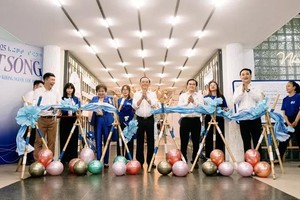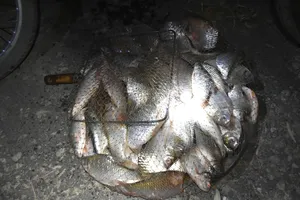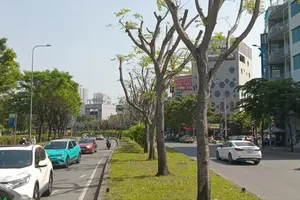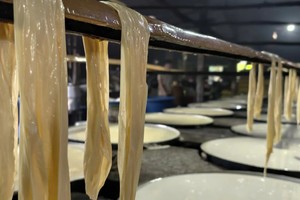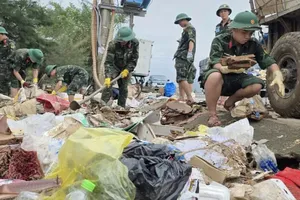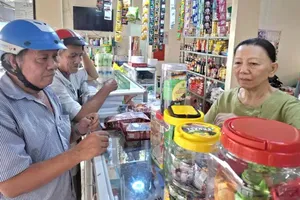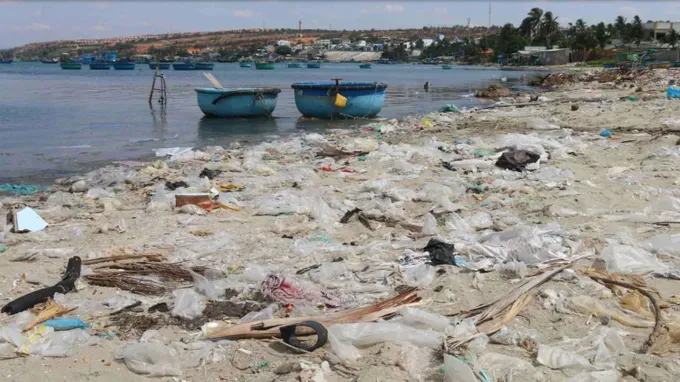
In Mui Ne Ward of Lam Dong Province, the relentless advance of coastal erosion has left many tourism businesses in a desperate position, watching their beachfronts disappear and their properties sustain heavy damage.
In response, many have taken matters into their own hands by building makeshift sea walls – giant sandbags dropped in lines stretching out from the shore or laid parallel to it, all in a frantic effort to break the waves and hold onto what little sand remains. “We can’t just stand by and watch the sea sweep away our beach and our property”, one resort owner shared. “Right now, building a temporary barrier is the only way we can hold our ground and preserve the scenery for tourists.”
These ad-hoc defenses, however, are seen by many as ugly “scars” on the face of the ocean. “The beach in Mui Ne looks like it’s been clumsily patched up; it’s become distorted and deformed”, observed Tran Viet Tien, a tourist from HCMC. “It makes you feel anxious when you go for a swim.”
Local authorities admit that allowing these temporary walls was a stopgap measure, intended to mitigate corporate losses and protect the coastline. But this has its own drawbacks. With no master plan, each business has pursued its own strategy, resulting in a haphazard, uncoordinated approach. The dangerous consequence is that this chaotic patchwork of walls disrupts coastal currents, which can paradoxically exacerbate erosion in adjacent areas.
Beyond the threats of erosion and encroachment, Mui Ne beach is also choking on ocean waste. “Thankfully, the issue of locals littering has improved significantly”, reported Permanent Vice Chairman Tran Van Binh of the Binh Thuan Province Tourism Association. “The problem now is the increasing amount of ocean debris from offshore fishing activities that washes ashore, especially after the monsoons. We still don’t have a definitive solution for it.”
Meanwhile, in Nha Trang Bay, a different set of problems is tarnishing the area’s tourism image. Public beaches are being progressively squeezed by private interests. Kiosks, rental chairs, and pop-up dining areas are encroaching on the sand, shrinking the space available to the public. Compounding this is the alarming sight of untreated wastewater flowing directly into the sea, deterring tourists from swimming.
Le Van Duc from Tay Nha Trang Ward expressed his frustration. “It’s disappointing to see parts of the beach along the main Tran Phu-Pham Van Dong road taken over by tables, chairs, and even street food carts”, he said. “There’s no room left for residents or tourists to just sit, relax, and enjoy the water.”
Faced with this mounting crisis, residents, businesses, and experts in Mui Ne Ward agree that a comprehensive, long-term solution is urgently needed. “To handle the erosion, the government needs to launch a properly engineered ‘soft seawall’ project along the entire Mui Ne coastline”, proposed Permanent Vice Chairman Tran Van Binh. He suggested a public-private partnership where resorts would help fund the sections fronting their properties, while the state would cover the costs for public residential areas.
This call to action has reached the local government. Chairman Le Thanh Son of the Mui Ne Ward People’s Committee confirmed they have escalated the issue to provincial authorities. “We have proposed the rapid construction of a unified soft seawall system to create a continuous, stable coastline”, he said. As for the waste problem, he added, “We regularly organize clean-ups, but to truly solve it, the top priority must be raising awareness among fishermen to stop them from dumping trash and old fishing gear into the sea.”
In Nha Trang Ward, authorities are beginning to crack down. According to the ward’s Public Utility Services Management Board, numerous businesses have already been fined for beach encroachment. The Khanh Hoa Province Department of Agriculture and Environment has also formally requested that provincial leaders take decisive action to end the direct discharge of wastewater into the bay.
Chairman Tran Xuan Tay of the Nha Trang Ward People’s Committee affirmed his administration’s stance. While the government supports legitimate business, he stated, “We are resolute in not tolerating any illegal or harmful practices that damage Nha Trang’s image. We will strictly handle all violations, including penalizing those who enable them. We urge residents and tourists to report incidents promptly so that, together, we can put an end to this problem.”



